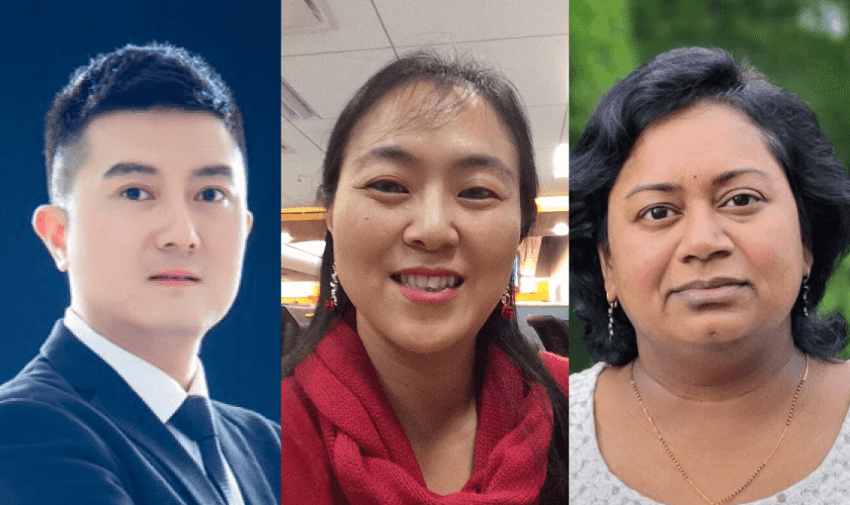Vonage Recognizes Asian American and Native Hawaiian / Pacific Islander Heritage Month
Vonage honors Asian American and Native Hawaiian / Pacific Islander Heritage Month to recognize the accomplishments of the Asian American and Native Hawaiian / Pacific Islander (AANHPI) communities in the United States and throughout the world.

With the recent violent attacks on Asian Americans, amplified by the COVID-19 pandemic, there is even more of an urgency to remember that our differences are what make us stronger. Now more than ever is it necessary to stand in solidarity with the AANHPI community and acknowledge the generations of Asian and Native Hawaiians / Pacific Islanders who have impacted America’s history and are actively part of its future.
How Asian American and Native Hawaiian / Pacific Islander Heritage Month Came to Life
The early incarnation of recognizing people of Asian and Native Hawaiian / Pacific Islander descent took shape in the 1970s when a joint resolution was passed to direct the President to recognize the first 10 days in May as Pacific/Asian American Heritage Week. This proclamation remained in place until 1990, when Congress passed a law to have the President issue a proclamation for the United States to observe and designate the entire month of May as Asian/Pacific American Heritage Month. Then in 2009, the month was renamed Asian American and Pacific Islander Heritage Month and in 2021, the current U.S. President Joe Biden included Native Hawaiians, as well.
Long History in the American Story
Selecting May for Asian American and Native Hawaiian / Pacific Islander Heritage Month commemorates the arrival of the first Japanese immigrant in the United States on May 7, 1843, and acknowledges the completion of the transcontinental railroad on May 10, 1869, the making of which employed approximately 20,000 Chinese immigrants.
The AANHPI population in America is quite diverse, with 49 ethnic groups and more than 100 languages spoken. Yet, there is still a lack of awareness of AANHPI stories and avenues to amplify their voices and show their contributions to history. In America, how many of us are aware that as early as 1763, the first Filipino settlement in America was established in the St. Malo bayous, near New Orleans? Or that 58 Chinese Americans fought in the Civil War? These are only a couple of examples to highlight that the AANHPI story is part of the American story and that it is all of our responsibility to amplify and create space where we can share and learn from their contributions.
Contributions to the Fields of Telecommunications and Fiber Optics from Members of the AANHPI Community
Here are three individuals who are trailblazers from the AANHPI community. Their contributions helped to propel the field of telecommunications forward.
- Jagdish Chandra Bose (November 30, 1858 - November 23, 1937) is known as the father of wireless telecommunications, inventing the Mercury Coherer radio wave receiver that was then used by Guglielmo Marconi to create a two-way radio. Bose first demonstrated the science behind capturing radio waves, but remains unknown to many because he did not patent his work.
- Rajeshwari Chatterjee (January 24, 1922 - September 3, 2021) was the first woman engineer from Karnataka, India and the first woman scientist to pioneer the field of microwave engineering. She received several awards including the Mountbatten prize, J.C Bose Memorial prize and Ramlal Wadhwa Award for her research and teaching work at the Institute of Electronics and Telecommunication Engineers. She also trained in the Division of Radio Frequency Measurements at the National Bureau of Standards in Washington, D.C. After returning to India, she taught electromagnetic theory, electron tube circuits, microwave technology and radio engineering at the IISC Department of Electrical Communication Engineering in India.
- Narinder Singh Kapany (October 31, 1926 - December 4, 2020) is often referred to as one of the “fathers of fiber optics” because of his work in the field and is credited with coining the term in a 1960 article in Scientific American. He also is credited with writing the first book about the new field and serving as a researcher and founder of a few optical technology companies.
- Charles Kuen Kao (November 4, 1933 - September 23, 2018) is another individual heralded as one of the “fathers of fiber optics” for his pioneering work in fiber-optic communications. In the 1960s he identified certain physical properties of glass, which became the groundwork for high-speed data communication. Before his work, glass fibers were believed to be unsuitable as a conductor of information. Through his work, Kao determined that very pure glass would be able to transport sufficient light. In 2009, Kao shared the Nobel Prize in Physics for groundbreaking achievements concerning the transmission of light in fibers for optical communication.
Supporting AANHPI Communities
While people with origins in Asia, Hawaii and the Pacific Islands use this month to showcase their pride and amplify their voices, this is a celebration that everyone can take part in. Now more than ever, AANHPI allies are needed. Allies can show their support by helping to amplify AANHPI stories and working to create safe spaces where people can bring their entire selves to the table. There are resources available to learn more about how to be an ally and support different AANHPI initiatives. You could even take the Bystander Intervention training from Hollaback!, an anti-harassment organization in partnership with Asian Americans Advancing Justice. This training offers free bystander intervention training to help you if you witness anti-Asian harassment. Or if you witness an AANHPI hate incident, there are places where you can report it including stopaapihate.org.
Join us in recognizing Asian American and Native Hawaiian / Pacific Islander Heritage Month by learning more about AANHPI history, culture and achievements.